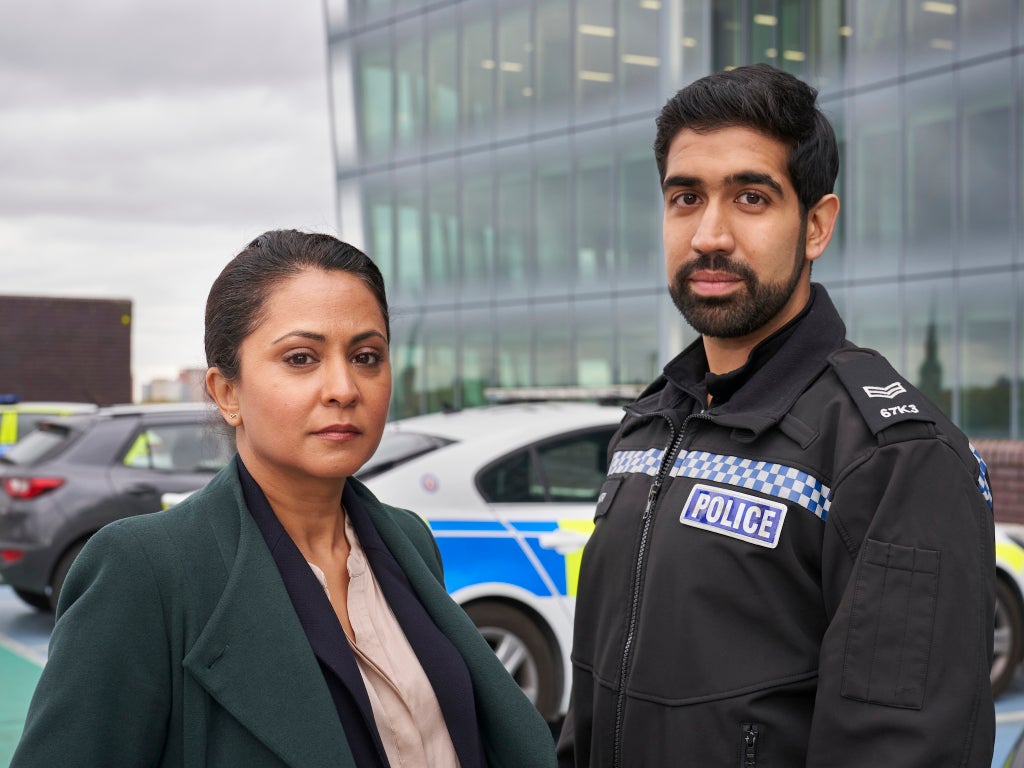
Forgive me a little self-indulgence, but something I have waited all my life for – perhaps without even realising it – has arrived: a smart, sassy, tough telly detective from… Leicester. Yes, that’s right. Not the streets of San Francisco, the rural idyll of Midsomer, or the brooding Scandinoir, but the second city of the East Midlands. Indeed so. A world first, even if she is actually on duty in a lightly fictionalised version of… Birmingham. And it doesn’t get more glam than that.
Detective Inspector Rachita Ray (Parminder Nagra, “also” from Leicester) is a gifted response officer who wins a transfer, at last, to her dream job in the murder squad after winning a bravery award. The chief inspector tells her proudly that, despite being overlooked for so long, she is “exactly what we need right now”. What this turns out to be is an assignment in the sensitively named “Culturally Specific Homicide” (CSH) team. Ironically, this turns out to be something of a hostile environment for her, as they even view someone from the “East Mids” (no one says that in the Midlands) as some sort of visitor from a more advanced civilisation. She has a uniformed subordinate, also of South Asian background, PS Tony Khattri (Maanuv Thiara), but all he does is make snide, culturally loaded remarks about her “agenda”.
When he boasts of his fluency in Hindi, Punjabi and Urdu, she retorts that she’s got a GCSE in Spanish. She always speaks English, even when suspects, witnesses and indeed her sidekick dip in and out of it. Her white colleagues commit all the usual unconscious faux pas – mixing her up with another PC who is a person of colour, asking “where are you really from”, and, arguably, tokenising her in the “culturally specific” team, as if a butchered white victim is too good for her. As Ray explains to her secret boyfriend, also a copper, (Jamie Bamber), she feels she has only been “brought in to tick a box”.
But has she? Her CSH group is surprisingly undiverse and led by a markedly unsympathetic character, DCI Henderson (who frankly behaves like she wouldn’t be all that bothered if her own kids were butchered in a gang shoot-out. Or indeed if DI Ray suffered a similar fate). The tension between the pair is exquisite, and the hatred actually runs so deep there isn’t any need for racial tension. They just despise each other for what they are. Which is progress, I suppose.
All DCI Henderson wants is for a couple of innocent Asian lads to be convincingly framed for what looks like a routine killing of another Asian – and that’s putting only a mildly unkind gloss on it. A young Muslim man, dating a Hindu girl, has been stabbed to death, and “the Kapoor brothers” (Ryan McKen and Manpreet Bachu) look to be the obvious culprits in a typical honour killing, underpinned by a business rivalry. Their alibi, that they were at temple and then a petrol station at the time of the crime doesn’t add up. Henderson doesn’t want to waste any more time on it, even though the girlfriend who needs questioning has disappeared. It’s DI Ray who fills the holes in the alibis with some sharp observation and impeccable logic (petrol station CCTV has the wrong timestamps). She also manages to reach out to the terrified girl. Nagra, petite and vulnerable, makes us want DI Ray to succeed and we’re rooting for her. She’s a cop. She’s not that in love with being one but wants to be: it’s a perfect balance.
Being a Jed Mercurio production and written by Maya Sondhi, DI Ray has plenty of twisty bits, and the subplot of her relationship with a white officer meshes well with the search for the killer.
There’s a moderate amount of overt racial abuse, but much more of the subtle, casual, “microaggression” kind that many are only now coming to understand is wrong, intended or not, and has been deeply distressing to people of colour for decades. Low key in tone and atmosphere, DI Ray, cop and show, that is, deserves to be a success. Mercurio ticks another box.







